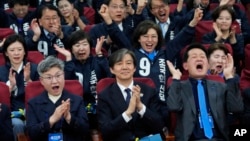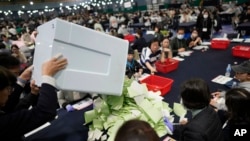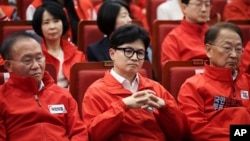South Korea’s left-leaning opposition appears headed for a decisive victory in Wednesday’s legislative election, according to exit polls, an outcome that could hamper the agenda of conservative President Yoon Suk Yeol.
The main opposition Democratic Party is on track to easily maintain its majority in the 300-seat National Assembly and could exceed a crucial two-thirds threshold if smaller, allied parties are counted, according to the exit polls conducted by three national broadcasters.
According to tentative figures, voter turnout was at 67%, the highest in more than three decades for a legislative election. The vote was widely seen as a midterm referendum on Yoon, who is two years into a single, five-year presidential term.
Yoon, a former chief prosecutor, has seen consistently low approval ratings as he deals with issues such as rising food prices, excessive housing costs, labor disputes and a plummeting birth rate.
Final election results are not expected until early Thursday. Depending on the opposition’s margin of victory and how it chooses to wield its power, the results could severely restrict Yoon’s ability to govern.
If left-leaning forces win more than 200 seats, they would have the ability to override Yoon’s veto on legislation. They could also start the process of constitutional revision and even impeach Yoon.
Some high-profile opposition politicians have hinted they would pursue Yoon’s impeachment, although it is not clear on what grounds. Yoon has been embroiled in a series of scandals, including one involving hidden camera footage appearing to show his wife accepting a luxury Dior bag as a gift. Yoon has also pursued criminal charges against critical journalists and media outlets at a record pace.
Lee Sang-sin, who focuses on political science and public opinion at the Korea Institute for National Unification, says he does not expect opposition forces to immediately pursue impeachment, noting the country’s Constitutional Court — which could strike down any such effort — is filled with Yoon allies.
“If liberals do have the supermajority, it is uncharted territory. So nobody knows,” Lee added. According to Korean media, no single political force has ever controlled two-thirds of National Assembly seats.
The Democratic Party has supported constitutional changes, including allowing presidents to serve a second term, and for the National Assembly rather than the president to nominate the prime minister. Any changes to the constitution must be approved by more than 50% of voters in a national referendum.
“Changing the constitution is also very hard. I still think the possibility that they even try would be very low,” Lee said.
Since taking office, Yoon has faced significant barriers to his domestic legislative agenda, since opposition forces already controlled the 180 seats needed to block any attempts to delay legislative procedures.
But South Korea’s powerful presidency has given Yoon a relatively free hand in foreign policy. Yoon has used that power to move his country much closer to the United States, its longtime ally, as well as Japan, South Korea’s former colonial ruler.
Foreign policy was not an issue in the election, which was instead dominated by allegations of corruption, intra-party divisions and fierce personal attacks.
Yoon’s foreign policy direction may not be greatly affected by the election result, according to Benjamin A. Engel, research professor at the Institute of International Affairs at Seoul National University.
“The National Assembly is extremely weak when it comes to foreign policy. They can critique and complain, but Yoon doesn’t have to change unless he wants to for political reasons — which he never seems to do –— for better or worse,” Engel said.
Much depends on whether South Korea’s liberals can overcome their fierce internal divisions, which resulted in a one-time rising political star, former Justice Minister Cho Kuk, splitting from the DP to form his own party just ahead of this election.
“I think, honestly, no one really knows at this point,” said Mason Richey, associate professor of international politics at Seoul's Hankuk University of Foreign Studies. “It depends on how many seats the Democratic Party gets, how Yoon reacts, and how his party reacts.”







